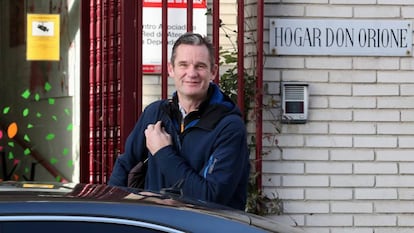Spanish king’s brother-in-law enjoys Christmas break from prison
Iñaki Urdangarin was seen with his wife, Cristina de Borbón, after being granted a four-day leave from jail, where he is serving a five-year sentence for embezzlement

Iñaki Urdangarin, the brother-in-law of Spanish King Felipe VI, spent Christmas Eve and Christmas Day with his family after being granted a four-day leave by prison authorities.
Urdangarin is classed as a Grade 2 prisoner, meaning he can request up to 36 days of leave a year
Urdangarin, who is married to the king’s sister Cristina de Borbón, who is known in Spanish as an infanta, is serving a five-year, 10-month prison sentence at the Brieva penitentiary in Álava province for his involvement in a scandal known as the Nóos case. He was found guilty by the Spanish courts of tax fraud, embezzlement and influence peddling, and entered prison on June 18, 2018.
The former duke of Palma left prison on Tuesday to volunteer at Hogar Don Orione, a center for intellectually disabled adults in the Madrid municipality of Pozuelo de Alarcón, where he has been working twice a week since September.
After completing his six-hour day at the center, Urdangarin donned dark glasses and sat in the passenger seat while Cristina de Borbón drove him to Vitoria, the capital of Basque Country. The former Olympic handball medalist emerged from his mother Claire Liebaert’s house, accompanied by Cristina de Borbón and other members of their family, to attend mass in the Sagrada Familia church. After the service, he walked with his wife and children close to the family home, but refused to talk to the press.

Urdangarin requested prison leave at the end of November, after serving the requisite quarter of his five-year and 10-month sentence. Although the 51-year-old asked for seven-days leave – the maximum allowed by law – both the prison authorities and the Judge Florencio de Marcos of the Prison Supervision Court reduced the number to four. The public prosecutor did not object to the leave. The former duke will return to the Brieva penitentiary, where he is held in the “men’s module” of the women’s prison, on Saturday.
Urdangarin is classed as a Grade 2 prisoner, meaning he can request up to 36 days of leave a year after serving a quarter of his sentence. Considered a preparation for life after release, the days must be spread out and no more than seven can be taken at one time.
At the end of January, the prison authorities and the judiciary will revise Urdangarin’s status following his application to be classed as a Grade 3 prisoner, which would allow him a far greater degree of freedom with an obligation to spend no more than Monday to Thursday nights behind bars. It would also mean he can request 48 days of leave a year.
Nóos graft case
Urdangarin and his ex-business associate, Diego Torres, were the leading figures at the Nóos Institute, a non-profit that secured no-bid contracts from the regional governments of Valencia and the Balearic Islands using Urdangarin’s influence.
Urdangarin and Torres also used their non-profit to divert around €6.2 million from public contracts secured for organizing sports events into private accounts. Urdangarin’s wife, Cristina de Borbón, sat on the board of a company, Aizoon, that was allegedly used to channel part of these funds. She was made to testify in the case, and was ultimately fined for having benefited from her husband’s scheme, but was acquitted of tax fraud complicity.
English version by Heather Galloway.
Tu suscripción se está usando en otro dispositivo
¿Quieres añadir otro usuario a tu suscripción?
Si continúas leyendo en este dispositivo, no se podrá leer en el otro.
FlechaTu suscripción se está usando en otro dispositivo y solo puedes acceder a EL PAÍS desde un dispositivo a la vez.
Si quieres compartir tu cuenta, cambia tu suscripción a la modalidad Premium, así podrás añadir otro usuario. Cada uno accederá con su propia cuenta de email, lo que os permitirá personalizar vuestra experiencia en EL PAÍS.
¿Tienes una suscripción de empresa? Accede aquí para contratar más cuentas.
En el caso de no saber quién está usando tu cuenta, te recomendamos cambiar tu contraseña aquí.
Si decides continuar compartiendo tu cuenta, este mensaje se mostrará en tu dispositivo y en el de la otra persona que está usando tu cuenta de forma indefinida, afectando a tu experiencia de lectura. Puedes consultar aquí los términos y condiciones de la suscripción digital.








































